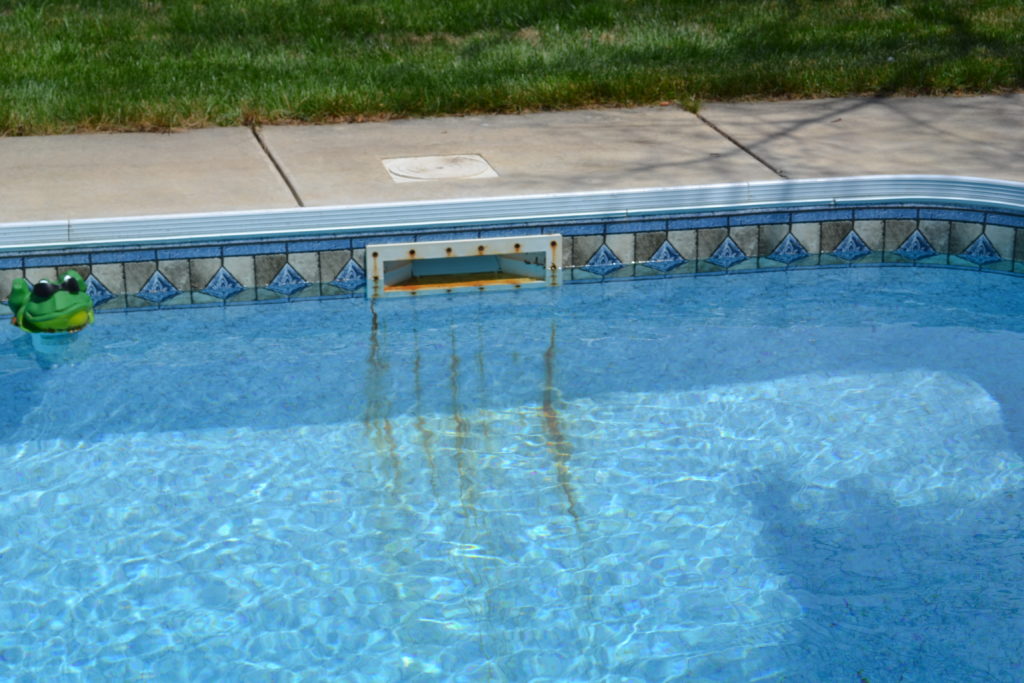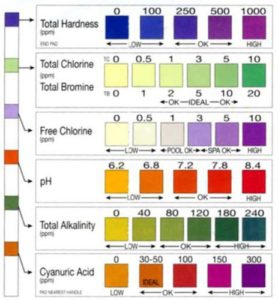
You hear it over and over, balance your pool water. We get questions all the time at Ask the Pool Guy, what are the proper water chemistry levels? How do I know if my water is balanced? Here is a chart for a quick reference guide:
Fresh, Clear, Pretty Water Still Needs to Be Balanced!
Just because your pool looks clean and clear that doesn’t mean it’s properly balanced. Your pool must especially be balanced if you performed an acid wash, had the vinyl liner replaced, or if you introduced new fill water. Improperly balanced pool water will cause many issues for your pool from scaling to corrosion.
We recommend testing your water 1x/week with test strips for a test kit, and bring a water sample to your local pool store 1x/month during the summer for comprehensive water testing.
Water Chemistry Guide by Ask the Pool Guy 4 page
So What If I Don’t Balance My Pool Water?
Swimming pools without proper water chemistry can result in wrinkled liners, rust stains, etching or staining on the surface of your pool (gunite/pebble/marcite/hybrid), as well as deterioration of the metals in your pool equipment. All of these issues can cause costly repairs and the worst part is, they are preventable!
Water Chemistry Quick Reference:
- FCL 1.0-3.0 ppm
- pH 7.2-7.6
- TA or ALK 80-120
- CH 200-350 Gunite Pools or 150-200 Vinyl Pools
- CYA 30-60
- TDS <1500 in non salt pools, the lower the number the better
Water Chemistry Quick Definitions:
- Free Chlorine (FC)- Free chlorine does the hard work of killing bacteria and oxidizing contaminants. Chlorine must be constantly replenished.
- Total Chlorine (TC) – When the free chlorine combines with contaminants, it becomes combined chlorine, or chloramines. In water, this form of chlorine has very little sanitizing ability, and no oxidizing ability. Total chlorine is just the sum of both combined chlorine and free chlorine.
- pH (Acidity/Alkalinity) – Needs to be kept in balance to prevent irritation and protect the pool equipment. (7.2 to 7.6)
- Total Alkalinity (TA) – Appropriate levels help keep the pH in balance. High levels can cause pH to rise. Always adjust TA before adjusting pH
- Calcium Hardness (CH) – Appropriate levels help prevent plaster damage. High levels can cause calcium scaling, low levels plaster etching.
- Cyanuric Acid (CYA) – Protects chlorine from sunlight and determines the required FC level.
- Salt – The salt level should be in line with the salt generator manufacturer directions. Under 4,000 ppm according to the Pentair IntelliChlor Units (3,000-3,500)
A note about: Salt Water Pools – when you are generating chlorine with a salt water system you may find that the pH tends to run high. Liquid chlorine has a pH of approx. 8. To offset this pH you may need to add pH reducer or muratic acid to the pool. You can also keep the alkalinity on the low end of around 80ppm which should help the pH stay on the lower levels.

